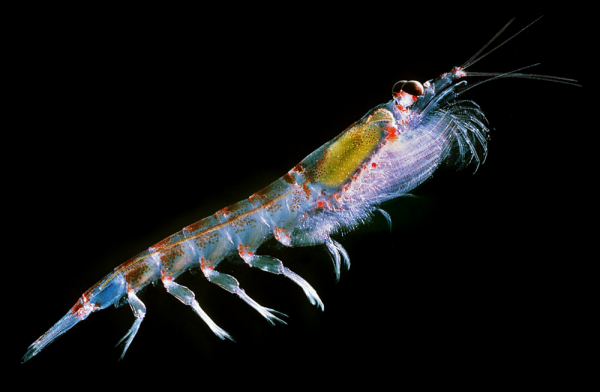The Royal Society of Tasmania invites you to a Zoom webinar by Dr Jessica Ericson on November 8, 2020, at 3pm.
To participate in this webinar, you must register in advance; click here to do that. After registering, you will receive a confirmation email containing information about joining the webinar.
Antarctic krill (Euphausia superba) are fascinating invertebrates with an important role in the Southern Ocean, as the primary prey of Antarctic whales, seals, penguins, fish, squid and seabirds. Krill are lipid rich, making them a particularly nutritious food for their predators.

Many of us know what animals eat krill, but what do krill eat and what makes them so nutritious? This PhD research used fatty acids as dietary biomarkers to investigate the diet of krill over consecutive years and seasons, filling knowledge gaps on krill diet, especially in winter. Because krill are so important in the food web, any decreases in krill biomass could result in a major ecological regime shift.
Little is known about how climate change will affect krill. As part of this PhD research, the first long-term study (one-year) was carried out to investigate the effects of ocean acidification on the physiology and biochemistry of krill. These novel results, and those from other recent studies will be discussed.
About the speaker
Dr Jessica Ericson — Post-doctoral Research Scientist (Shellfish Ecophysiology and Aquaculture) at Cawthron Aquaculture Park, New Zealand — specialises in the study of ecologically and economically important marine invertebrates from temperate and polar regions.
Her research primarily focuses on how climate change stressors (e.g. ocean acidification and warming) affect the physiology, biochemistry, immunology and behaviour of different invertebrate species. She has studied a wide range of ‘charismatic micro-fauna’ including limpets, mussels, oysters, sea urchins and krill. The unique responses of these organisms to their environment always provide opportunities to learn something new.
Her studies have taken her to remote locations including Antarctica and she has spent many weeks at sea on research voyages. Jessica was born in New Zealand and comes from a long line of lighthouse keepers and scientists, so believes it is no coincidence that she chose marine science as a career path. She is also a keen mountain biker, ocean swimmer and printmaker. She lives in Nelson, New Zealand, but considers Tasmania to be her second home.
